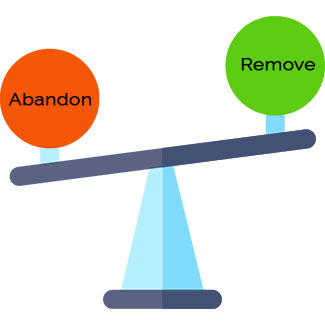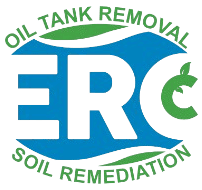Oil Tank Removal vs Oil Tank Abandonment
Should I remove my oil tank or abandon it in place?
When an oil tank is taken out of service in New Jersey, one of two practices are followed: abandonment or removal. We’ll go through a little bit of information here to help you understand the best course of action.

Oil Tank Abandonment- A Temporary Fix
Abandonment presents a major problem in that buyers often insist an oil tank be removed even if it has been abandoned properly. Even if an oil tank has been abandoned correctly in accordance with NJDEP guidelines, there often remains uncertainty that hinders real estate transactions. As cleaning/filling oil tanks and abandoning them in place was an accepted practice in the past, many issues with the process have been uncovered in recent times. The NJDEP is not required to get involved with an oil tank abandonment unless it has been determined that there is evidence of a leak, and companies in the past have lacked thoroughness in uncovering some of these issues. As a result, buyers have inherited oil tanks that have leaked through the bottom or elsewhere where a leak was not detected at the time of abandonment. As a result, even the most thorough of paperwork or past soil testing results will alleviate a seller from removing the out of service oil tank completely – buyer’s insurance and mortgage companies are simply unwilling to take on the liability of any tank, and it’s going to have to be removed in most cases one way or another if you want to sell your property. The NJDEP even directly recommends that all out of service underground oil tanks be removed, even if they were previously abandoned.
Oil Tank Removed Means Gone For Good
Removing an oil tank is the only way to ensure that it will never again become a liability to you or a future owner. As there have been thousands of oil tanks removed in New Jersey in recent years, the process is rigid and a certified company like ERC knows the requirements completely. The oil tank removal report defines definitively that the removal has been performed properly and approved by the building department. In cases that require soil remediation, the process will be clearly defined and the NJDEP will issue a No Further Action (NFA) letter. Ultimately, once you remove an oil tank once and for all the headache it comes with is gone with it. Trust us- it’s the only way to prevent it from becoming an obstacle once you want to sell! The choice is easy- do not abandon an underground oil tank in place. Remove it from the ground and from your life forever!
Contact.
Contact us today to get started.
Call: 877-440-TANK (8265)
You can also fill out the form below and we’ll contact you within 24 hours:

